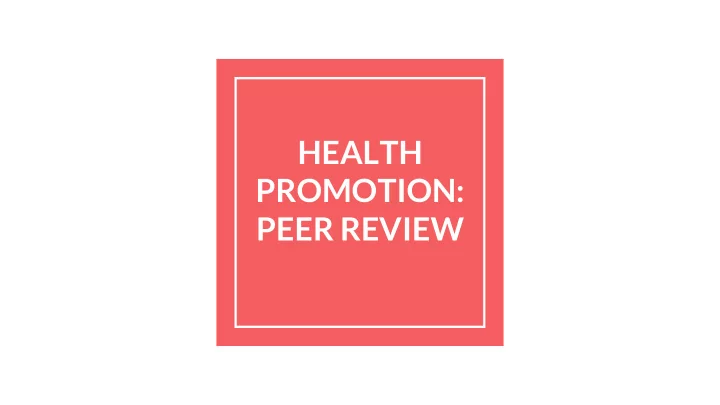

HEALTH PROMOTION: PEER REVIEW
Christine Johnston, MPH Assistant Director, Alcohol & Other Drug Education and Health Promotion Springfield College Emily Pagano, MS Introductions Alcohol and Other Drug Education Coordinator University of Connecticut Tara R. Schuster, MS, MCHES Coordinator of Health Promotion Rensselaer Polytechnic Institute
Thanks and Acknowledgement Michelle Mandino Colby Zongol Joleen Nevers Claudia Trevor-Wright Fran Taylor Ryan Travia
Learning Outcomes 1. Identify three peer review strategies used by health promotion specialists to provide expert assistance and guidance. 2. Explain three factors that foster or hinder the peer review process. 3. Apply knowledge of peer review strategies by conducting a review of work submitted by peers.
Agenda 1. All about peer review 2. A primer for today’s peer review 3. Two peer review sessions (20 minutes each) 4. Process & follow-up
What is Peer Review? Evaluation by others in the same field to maintain or enhance the quality of the work or performance. ★ Utilizes the independence of the reviewers to obtain an unbiased evaluation ★ Helps maintain and enhance quality by detecting areas for improvement
Why should we use Peer Review? ★ Accreditation ★ Best Practices ★ Strengthens program development skills ★ Enhances quality and integrity of programs ★ Provides differing points of view for consideration ★ Helps to engage stakeholders ★ Role-models professionalism
Best Practices ★ Standards of Practice in Health Promotion in Higher Education ★ Council for the Advancement of Standards in Higher Education ★ BACCHUS Peer Education ★ Healthy People 2020 ★ CHES/MCHES
Peer Review Strategies Campus Stakeholders ★ Face-to-Face ★ Local & Area Connections ★ Email/Listservs ★ Peer & Aspirational Schools ★ Skype ★ National Connections ★ Conference Calls ★ Professional Consultation ★
Ground Rules for Today Trust is key ★ Acknowledge vulnerabilities ★ Be open to receiving feedback ★ Provide constructive feedback ★ Start with the positive and move to areas of improvement ○ Ask lots of questions, especially open-ended ones ★ Try to suspend judgement ★ Maintain confidentiality ★ Be clear with your colleague(s) about what is/is not ok to share outside of peer review. ○ If you don’t know, ask. ○ Check-in with your colleague ★ How are you feeling about this? Is this helpful? ○ Only share examples of your own work when asked ★
Feedback Is... ★ Solicited , not imposed ★ Descriptive , not evaluative directed towards something Actionable ★ ★ Considerate of the needs of the giver and receiver ★ Well-timed ★ Confirmed to ensure clear communication
Presenter Instructions ★ Tell reviewers ○ about the work you want reviewed ○ what feedback you want ★ Provide example(s) of what you want reviewed ★ Allow time for them to process ★ Accept feedback ★ Ask follow-up questions
Reviewer Instructions ★ Listen to what the person is asking to have reviewed ★ Ask clarifying questions to understand what feedback is being solicited: How can I help? ○ What have you done so far? ○ What do you see as obstacles? ○
Reviewer Instructions ★ Provide feedback professionally Be mindful of the person’s feelings and expectations of the ○ process ★ Only provide examples of your own work when asked VOLUNTEERS NEEDED: Note taker; Time keeper
Let’s Peer Review! Group #1: Group #2: Jamie Bentley, MPH Tiffany Mathews, MS Coordinator of Wellness Education Coordinator of Wellness Education Castleton University Keene State College
Let’s Debrief ★ What was most helpful? ★ Describe one take-away. ★ What would have worked better?
The Culture of Peer Review ★ Values that contribute to a culture of peer review: ○ Excellence ○ Collaboration/Community ○ Student-Centeredness ○ Professional Development ★ Others?
Once NECHA/NYSCHA is over... ★ Case discussions/review (UConn) ★ Peer review forms (Rensselaer Polytechnic Institute) ★ Student Health Integration Team (Springfield College) ★ Other examples?
UConn
Rensselear Polytechnic Institute
Recommend
More recommend